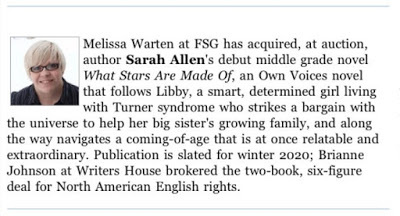Sarah Allen's Blog, page 5
May 16, 2020
Dear Airplanes

Dear Airplanes,
Sky cotton washed in
light, beaming the way your wings
and my soul tip up.
From Sarah, with joy
***
Recommended Read: A Wish In the Dark, by Christine Soontornvat
Published on May 16, 2020 11:46
April 20, 2020
Dear St. Paul's Cathedral

Dear St. Paul's
So Christopher Wren,
you've built quite a grand mess hall
for souls and pigeons.
From Sarah, with joy
***
Writing Lesson from St. Paul's:
Like Christopher Wren, take a classic model and put your own twist on it, or take two classic forms and mash them together!
***
Recommended Read: My Life as a Potato by Arianne Costner
Published on April 20, 2020 06:00
April 15, 2020
Dear Scotland

Dear Scotland
Aorta for pipes,
play me atop the bone crisp
hills. The music's here.
From Sarah, with joy
Recommended Read: Coo, by Kaela Noel
Published on April 15, 2020 17:10
December 9, 2019
4 Steps to Being Published
1. Have something ready to publish.
Okay, believe me, I know that getting that publishing contract, seeing your book out on the shelves--that's such a real, shiny goal. It's so hard to have patience in the process. We want our book to be published NOW. But let yourself take the time you need to make the best book you can. Don't rush. Keep improving, keep writing, and the rest will come. Let your absolute best writing be the first, and ever-primary step.
2. Craft your best query.
After you've got a publishable manuscript, the next step is to get your query ready. Think of your query as three sections.
First paragraph: Introduce yourself, and the give the title, genre, and word count of the book your querying. Also tell the agent you're querying why you're querying them specifically. Do they represent writers whose books are like yours? Did you meet them at a conference?
Second paragraph: This is the summary of your project. It can be intimidating, but this too can be broken down into easy parts. Four, in fact. 1) Introduce your main character. 2) What is the goal your main character is trying to achieve? 3) What are the forces/people stopping your main character from achieving her goal or getting where she wants? 4) What devastating consequence will occur of your main character does not achieve that goal?
Third paragraph: Sign off quickly with any publishing credits you already have, and possibly comp titles if you have good ones. If you're worried about this and feel like you don't have good stuff to put in this paragraph, don't stress. Just say thanks, and keep it simple.
The best tip I can give for querying is to check out the Query Shark blog. It's a big archive but well, well worth the read.
3. Strategize your agent query approach
My personal recommendation is to send queries in batches of 5-10. That way, if one batch of agents all come back with similar feedback, you can take that into account as you prepare your next batch. You can use Agent Query to find agents. Another very good way to find agents is to look at the acknowledgements section of the books that are like yours, and see if the writer thanks their agent by name. They very often do, and then you've got the name of an agent who represents and likes the kind of thing you write.
Get ready to rinse and repeat this process. Its hard in the moment to remember that rejection isn't personal, but believe me, it's not. Think of all the books you've read and loved. Only a small percentage of those books are ones you love with a FIERY PASSION, right? Books you'd be willing to read dozens of times? And that doesn't you don't love the other books you love, or that other books aren't just as good. They're just not your soul books. Agents have to feel that strongly about your book, because they're going to be working on it for a long time. So keep going. It's worth it to have patience and find the person who believes in you and your book.
4. Work on the next thing.
This has been one of the best things for me to keep in mind at every stage of the publishing journey. STARS, my debut book, is my fourth. I worked on it while I was querying my other books; books that will never be published, and rightly so. With each project, we grow as writers, and that's exciting. So learn to finish. Then send out your project as determinedly as if it's your only project and your career depends on it, and then start work on the next thing as if its your only project and your career depends on it.
Keep going! This takes years of work, grit, and patience. It takes humility and constant learning. Find friends and mentors who can help and guide you on this process. Stick to it, and good luck!
Okay, believe me, I know that getting that publishing contract, seeing your book out on the shelves--that's such a real, shiny goal. It's so hard to have patience in the process. We want our book to be published NOW. But let yourself take the time you need to make the best book you can. Don't rush. Keep improving, keep writing, and the rest will come. Let your absolute best writing be the first, and ever-primary step.
2. Craft your best query.
After you've got a publishable manuscript, the next step is to get your query ready. Think of your query as three sections.
First paragraph: Introduce yourself, and the give the title, genre, and word count of the book your querying. Also tell the agent you're querying why you're querying them specifically. Do they represent writers whose books are like yours? Did you meet them at a conference?
Second paragraph: This is the summary of your project. It can be intimidating, but this too can be broken down into easy parts. Four, in fact. 1) Introduce your main character. 2) What is the goal your main character is trying to achieve? 3) What are the forces/people stopping your main character from achieving her goal or getting where she wants? 4) What devastating consequence will occur of your main character does not achieve that goal?
Third paragraph: Sign off quickly with any publishing credits you already have, and possibly comp titles if you have good ones. If you're worried about this and feel like you don't have good stuff to put in this paragraph, don't stress. Just say thanks, and keep it simple.
The best tip I can give for querying is to check out the Query Shark blog. It's a big archive but well, well worth the read.
3. Strategize your agent query approach
My personal recommendation is to send queries in batches of 5-10. That way, if one batch of agents all come back with similar feedback, you can take that into account as you prepare your next batch. You can use Agent Query to find agents. Another very good way to find agents is to look at the acknowledgements section of the books that are like yours, and see if the writer thanks their agent by name. They very often do, and then you've got the name of an agent who represents and likes the kind of thing you write.
Get ready to rinse and repeat this process. Its hard in the moment to remember that rejection isn't personal, but believe me, it's not. Think of all the books you've read and loved. Only a small percentage of those books are ones you love with a FIERY PASSION, right? Books you'd be willing to read dozens of times? And that doesn't you don't love the other books you love, or that other books aren't just as good. They're just not your soul books. Agents have to feel that strongly about your book, because they're going to be working on it for a long time. So keep going. It's worth it to have patience and find the person who believes in you and your book.
4. Work on the next thing.
This has been one of the best things for me to keep in mind at every stage of the publishing journey. STARS, my debut book, is my fourth. I worked on it while I was querying my other books; books that will never be published, and rightly so. With each project, we grow as writers, and that's exciting. So learn to finish. Then send out your project as determinedly as if it's your only project and your career depends on it, and then start work on the next thing as if its your only project and your career depends on it.
Keep going! This takes years of work, grit, and patience. It takes humility and constant learning. Find friends and mentors who can help and guide you on this process. Stick to it, and good luck!
Published on December 09, 2019 21:17
5 Steps to Being Published
1. Have something ready to publish.
Okay, believe me, I know that getting that publishing contract, seeing your book out on the shelves--that's such a real, shiny goal. It's so hard to have patience in the process. We want our book to be published NOW. But let yourself take the time you need to make the best book you can. Don't rush. Keep improving, keep writing, and the rest will come. Let your absolute best writing be the first, and ever-primary step.
2. Craft your best query.
After you've got a publishable manuscript, the next step is to get your query ready. Think of your query as three sections.
First paragraph: Introduce yourself, and the give the title, genre, and word count of the book your querying. Also tell the agent you're querying why you're querying them specifically. Do they represent writers whose books are like yours? Did you meet them at a conference?
Second paragraph: This is the summary of your project. It can be intimidating, but this too can be broken down into easy parts. Four, in fact. 1) Introduce your main character. 2) What is the goal your main character is trying to achieve? 3) What are the forces/people stopping your main character from achieving her goal or getting where she wants? 4) What devastating consequence will occur of your main character does not achieve that goal?
Third paragraph: Sign off quickly with any publishing credits you already have, and possibly comp titles if you have good ones. If you're worried about this and feel like you don't have good stuff to put in this paragraph, don't stress. Just say thanks, and keep it simple.
The best tip I can give for querying is to check out the Query Shark blog. It's a big archive but well, well worth the read.
4. Strategize your agent query approach
My personal recommendation is to send queries in batches of 5-10. That way, if one batch of agents all come back with similar feedback, you can take that into account as you prepare your next batch. You can use Agent Query to find agents. Another very good way to find agents is to look at the acknowledgements section of the books that are like yours, and see if the writer thanks their agent by name. They very often do, and then you've got the name of an agent who represents and likes the kind of thing you write.
Get ready to rinse and repeat this process. Its hard in the moment to remember that rejection isn't personal, but believe me, it's not. Think of all the books you've read and loved. Only a small percentage of those books are ones you love with a FIERY PASSION, right? Books you'd be willing to read dozens of times? And that doesn't you don't love the other books you love, or that other books aren't just as good. They're just not your soul books. Agents have to feel that strongly about your book, because they're going to be working on it for a long time. So keep going. It's worth it to have patience and find the person who believes in you and your book.
5. Work on the next thing.
This has been one of the best things for me to keep in mind at every stage of the publishing journey. STARS, my debut book, is my fourth. I worked on it while I was querying my other books; books that will never be published, and rightly so. With each project, we grow as writers, and that's exciting. So learn to finish. Then send out your project as determinedly as if it's your only project and your career depends on it, and then start work on the next thing as if its your only project and your career depends on it.
Keep going! This takes years of work, grit, and patience. It takes humility and constant learning. Find friends and mentors who can help and guide you on this process. Stick to it, and good luck!
Okay, believe me, I know that getting that publishing contract, seeing your book out on the shelves--that's such a real, shiny goal. It's so hard to have patience in the process. We want our book to be published NOW. But let yourself take the time you need to make the best book you can. Don't rush. Keep improving, keep writing, and the rest will come. Let your absolute best writing be the first, and ever-primary step.
2. Craft your best query.
After you've got a publishable manuscript, the next step is to get your query ready. Think of your query as three sections.
First paragraph: Introduce yourself, and the give the title, genre, and word count of the book your querying. Also tell the agent you're querying why you're querying them specifically. Do they represent writers whose books are like yours? Did you meet them at a conference?
Second paragraph: This is the summary of your project. It can be intimidating, but this too can be broken down into easy parts. Four, in fact. 1) Introduce your main character. 2) What is the goal your main character is trying to achieve? 3) What are the forces/people stopping your main character from achieving her goal or getting where she wants? 4) What devastating consequence will occur of your main character does not achieve that goal?
Third paragraph: Sign off quickly with any publishing credits you already have, and possibly comp titles if you have good ones. If you're worried about this and feel like you don't have good stuff to put in this paragraph, don't stress. Just say thanks, and keep it simple.
The best tip I can give for querying is to check out the Query Shark blog. It's a big archive but well, well worth the read.
4. Strategize your agent query approach
My personal recommendation is to send queries in batches of 5-10. That way, if one batch of agents all come back with similar feedback, you can take that into account as you prepare your next batch. You can use Agent Query to find agents. Another very good way to find agents is to look at the acknowledgements section of the books that are like yours, and see if the writer thanks their agent by name. They very often do, and then you've got the name of an agent who represents and likes the kind of thing you write.
Get ready to rinse and repeat this process. Its hard in the moment to remember that rejection isn't personal, but believe me, it's not. Think of all the books you've read and loved. Only a small percentage of those books are ones you love with a FIERY PASSION, right? Books you'd be willing to read dozens of times? And that doesn't you don't love the other books you love, or that other books aren't just as good. They're just not your soul books. Agents have to feel that strongly about your book, because they're going to be working on it for a long time. So keep going. It's worth it to have patience and find the person who believes in you and your book.
5. Work on the next thing.
This has been one of the best things for me to keep in mind at every stage of the publishing journey. STARS, my debut book, is my fourth. I worked on it while I was querying my other books; books that will never be published, and rightly so. With each project, we grow as writers, and that's exciting. So learn to finish. Then send out your project as determinedly as if it's your only project and your career depends on it, and then start work on the next thing as if its your only project and your career depends on it.
Keep going! This takes years of work, grit, and patience. It takes humility and constant learning. Find friends and mentors who can help and guide you on this process. Stick to it, and good luck!
Published on December 09, 2019 21:17
May 20, 2019
4 Non-Spoilery Writing Lessons from Avengers: End Game

1. Characters can feel SO REAL. We've spent so much time with these characters, particularly the original six. We've seen them behave well and badly, seen them victorious and devastated. I think it's seeing this range, seeing how differently each of them reacts in difference situations makes them feel like people we know.
2. Even action is enhanced when character is king. To be honest, this is where I think Marvel has excelled where DC has struggled. When we get a chance to see the characters move in normal life, and react with the people they love--when we know their quirks and eccentricities, then when the action is at a climax we are that much more invested. In the midst of big action and heavy battles we can get small moments of humor or crushing moments of poignancy, because we know these people and care about them. Man do we care.
3. SYMMETRY. ALWAYS SYMMETRY. Ok. Ok. I don't mean everything is about symmetry but man the Roussou brothers brought the story to such balanced symmetry I still almost can't bring myself to talk about it without getting teary eyed. Oh gosh it was so good. Whatever else happens symmetry can make your story feel not just complete but resonant in a way that will stay with your reader for ever and ever. If you do it as brilliantly as this movie it will ring in your bones for days.
4. Robert Downy Jr. deserves ALL THE ACADEMY AWARDS. Ok, not really a writing lesson here, unless you can figure out a way to distill the perfect purity that is RDJ into your writing. More just a statement of fact.
-Sarah
*come chat with me on Instagram and Twitter!
Published on May 20, 2019 06:00
March 25, 2019
TWO BOOK DEAL WITH FSG/MACMILLAN!!!
Guys I don't even have words right now.

I will come back here at some point and do a whole post about getting my agent, how the deal went down, what its been like, and all that. But for right now I just have to say I am so, so grateful. Grateful for every person whose supported me or taught me, online or irl, for my friends and family and everyone who's let me go after this and never told me my dream was unrealistic. I really almost can't believe that I get to do this thing.
You guys are awesome! And of course, keep writing!
Sarah

I will come back here at some point and do a whole post about getting my agent, how the deal went down, what its been like, and all that. But for right now I just have to say I am so, so grateful. Grateful for every person whose supported me or taught me, online or irl, for my friends and family and everyone who's let me go after this and never told me my dream was unrealistic. I really almost can't believe that I get to do this thing.
You guys are awesome! And of course, keep writing!
Sarah
Published on March 25, 2019 11:35
January 7, 2019
My Pet Vampire Squid

My Pet Vampire Squid
Mom says no waybut I know she doesn’t mean it.A Vampire Squid is a perfect pet.See, I know all about them.I know they’re not quite squid not quite octopustheir tentacle tips glow in the darklike eyeballsand when they’re afraidthey wrap themselves up in theirumbrella tentacleslike a long, dark cloak.I know just how they feeland how to take care of them too.All you need is a large tank in a dark roomand a little brotherwith plenty of blood.
-Sarah Allen
Published on January 07, 2019 07:00
July 30, 2018
The Pineapple House
 Image Source
Image SourceThe Pineapple House
Clementine had a pineapple housethat grew pineapples on every wall.They grew so fast and so many she said"I'll never have time for them all."She invited her family and friends, the whole town came to join her big pineapple bash.They ate pineapple ice cream and upside-down cakeand ran the pineapple yard dash.Folks had pineapple barbecue, pineapple juice,and pineapple filet mignon.They threw pineapple frisbys and pineappleoonsand played pineapple tag on the lawn.When the sun had gone down and the partywas over, and all Clem's relations withdrawn,she turned to go in to her pineapple bedand found her whole house was all gone.
-Sarah Allen
Published on July 30, 2018 07:00
July 23, 2018
I Don't Know How To Act At Funerals
 Image Source
Image SourceI Don’t Know How To Act At Funerals
because the person I want to ask about itthe person I want to talk to about itthe person I want to explain to mewhy my stomach has vortexed my skull isn’t here.
Published on July 23, 2018 08:51



